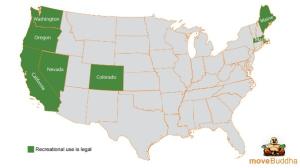This article was produced in collaboration with AlterNet and first appeared here.
In the euphoric aftermath of marijuana legalization victories in California, Maine, Massachusetts, and Nevada last November, the marijuana blogosphere was alive with predictions about which states would be next to free the weed. Extract listed 10 states, MerryJane went big with 14 states, the Joint Blog listed five states, Leafly homed in on six states, and Weed News went with seven states. AlterNet got into the act, too, with "The Next 5 States to Legalize Marijuana."

To be fair, we have seen significant progress in state legislatures. More legalization bills have been filed than ever before, and in some states, they are advancing like never before. In Vermont, a bill actually got through the legislature, only to fall victim to the veto pen. But actually getting a legalization bill past both houses of a legislature and a governor has yet to happen.
And while there is rising popular clamor -- buoyed by favorable opinion polls -- for state legislatures to end pot prohibition, the advocacy group most deeply involved in state-level legalization efforts, the Marijuana Policy Project (MPP), understands the difficulties and intricacies of working at the state house. While it has worked hard, it made no promises for victory this year, instead saying it is committed to "ending prohibition in eight more states by 2019."
That MPP list doesn't include initiative states, of which we could see a handful next year. MPP is already involved in Michigan, where legalization is polling above 50%, and first-stage initiative campaigns are already underway in Arizona, Arkansas, Missouri, and the Dakotas. It would be disappointing for reform advocates if they have to wait until November 2018 and the popular vote to win another legalization victory, and given the progress made in state houses this year, they hope they won't have to. Still, legalization at the state house is proving a tough row to hoe.
Drug War Chroniclethought the best prospects were in Connecticut, Maryland, New Mexico, Rhode Island, and Vermont. Here's what's happened so far:
Connecticut. Legalization isn't quite dead yet this year, but it is on life support. A legalization bill died in the General Assembly after getting several hearings this year, but failing to even get a vote in the judiciary and public safety committees. In a last-ditch move, Assembly Democrats this month included marijuana legalization in their budget recommendations as a means of addressing budget problems, but they conceded they don't have enough votes in their caucus to pass it and said they added legalization merely "to spur conversation." The dour figure of Gov. Dannel Malloy (D) and his hints of a veto didn't help.
Maryland. A Senate legalization measure, Senate Bill 927, and its House companion, House Bill 1186, both got committee hearings, but neither could get a vote out of disinterested committee chairs. A bill that would have amended the state constitution to legalize personal possession and cultivation, Senate Bill 891, suffered the same fate. The General Assembly is now adjourned until January 2018.
New Mexico. Hopes for legalization this year in the Land of Enchantment crashed and burned back in February, when a measure to do just that, House Bill 89, died an ignominious death in the House Business and Industry Committee. Four out of five committee Democrats joined all five committee Republicans to bury it on a 9-1 vote. And the legislature killed a decriminalization bill, too, before the session ended. Again, a veto threat-wielding governor in the background, Susana Martinez (R), didn't help.
Rhode Island. Although a full third of House members cosponsored the legalization measure, House Bill 5555, the House Judiciary Committee this month failed to vote on it, instead passing House Bill 5551, which punts on the issue by instead creating a commission to study marijuana legalization and report back in March 2018. That bill now awaits a House floor vote.
Vermont. The Green Mountain State became the first to see a marijuana legalization bill, Senate Bill 22, approved by the legislature, only to see it vetoed last week by Republican Gov. Phil Scott, who cited concerns about drugged driving and youth access. Scott did leave the door open for a modified bill to win his approval this year, but that would require legislators to agree on new language and get it passed during a two-day "veto session" next month, which in turn would require Republican House members to suspend some rules. That's looks unlikely, as does the prospect of a successful veto override. But it's not dead yet.

"This is still a historic time," said Justin Strekal, political director for the National Organization for the Reform of Marijuana Laws (NORML). "For the first time, we saw a state legislature pass a bill removing all penalties for the possession and consumption of marijuana by its citizens. We've had great victories in the past 10 years, but they've all been through the initiative process. Now, with the polls continuing to show majorities favoring outright legalization, legislators are feeling more emboldened to represent their constituents, but it won't happen overnight."
"We've seen bigger gains than any other year in history," said MPP Communication Director Mason Tvert. "There's never been a legislature in all our history that passed a law making marijuana legal for adults, and now one did. That's pretty substantial."
But Tvert conceded that legalization via the state house is a course filled with obstacles.
"In Rhode Island, the leadership is still holding it up, although it looks like it will pass a legalization study commission," he said. "In Delaware, a bill passed easily in committee, but it needs two-thirds to pass the House, and that's tough to do in the first year. In Vermont, last year, we had the governor, but not both houses of the legislature; this year we had the legislature, but not the governor," he elaborated.
"That's the nature of representative democracy and the structure of government in the US," Tvert said. "It requires a lot of pieces to fall into place."
"One of the biggest obstacles we face is the demographics of those chair those legislative committees," said NORML's Strekal. "They tend to skew toward older, more prohibitionist age brackets, but as these turn over to a new generation of legislators and elected officials, we should be able to get more of those bills out of committee, like we just saw in Delaware."
Tvert pointed to an example of the committee chair bottleneck in the Lone Star State.
"It's one thing to lose on a floor vote in the House," he said. "It's another thing to have a whip count showing you could win a floor vote, and you can't get a vote. That was the case in Texas with both medical marijuana and decriminalization. They had immense support and couldn't get votes."

"This is a situation where times are changing and people are becoming increasingly impatient," said Tvert. "When you have people's lives negatively affected by prohibition and obvious solutions staring you in the face, it's understandable that some people get antsy, but we've seen some pretty significant developments this year, and there will be more to come."
Tvert compared the legalization situation now with medical marijuana a few years back.
"With medical marijuana, we won in five initiative states between 1996 and 2000 before Hawaii became the first legislative medical marijuana state," he noted. "Since then, there've been nine more initiative states and 14 more legislative states. Now, we've seen eight states legalize in through initiatives in 2012 and 2016, Once this gets through one state legislature, the floodgates will open."
NORML's Strekal was taking the long view.
"In the grand scheme of things, this movement is chugging along much faster than other issues have advanced historically," he said. "It's important to keep in mind how far we've come."
But marijuana legalization is still a work in progress, and we've still yet to see that first legislative state fall. Maybe next year.
This work by StoptheDrugWar.org is licensed under Creative Commons Attribution-ShareAlike 4.0 International
Comments
Prohibition Prison Cartel
The War on Drugs/Citizens is the 5th largest employer in the USA, "land of the free". Our "elected public servants" are operating the largest criminal racketeering syndicate in history. The most destructive racketeering vehicle is the Prohibition Prison Cartel of Judges, Prosecutors, Lawyers, County Clerks, Police and Prison associations funnel tens of millions$$ to politicians to draft hundreds of corrupt laws that violate 9 of 10 of our Constitutional Bill of Rights which has been reduced to a worthless piece of paper. We have by far the highest incarceration rate by both percentage of population and numbers. Totaltarian China has 4x our population and 1/2 the number of citizens imprisoned. As reported by Investors Business Daily, big tobacco has spent hundreds of millions through their lobbyist to bribe Congess to legalize Cannbis and have it in all convenience stores by 2022. In the meantime, both the Drug Cartels and Prohibition Prison Cartel continue to make billions of dollars a year at the expense of We the People. Our streets are bloody war zones as prohibition monetizes violence, property crime, destroys famalies. The blood of over 1 million worldwide is on their hands.
Term limits, outlaw lobbyist, bribery, racketeering in government, ban political parties, election by lotto, stand alone legislation, repeal federal reserve act of 1913, reclaim our currency from global bankers, close DEA, ERA, and dozens of freedom stealing, unconstitutional agencies detrimental to the Constitution. Phase our ponce schemes like SSI, Medicare, Medicaid. privatize everything possible, return government to the People, for the People, by the People, not a bunch of lying corrupt lawyers who are treasonous criminals gaming the system for their own sick, twisted agenda.
New Mexico
Hopes for legalization this year in the Land of Enchantment crashed and burned becuase of how poorly of a job the Drug Policy Alliance people did in advising policy to lawmakers while teamed up with a medical cannabis program producer, Ultra Health, who wants to kill the medical program for legalizationAnd to have DPA there for every committee and see questions they could not provide answers for really hurt the overall cause: “Why should the Department of Health not have sole authority of the Medical Cannabis Program”, was asked in committee and DPA had no answer to that…
Add new comment